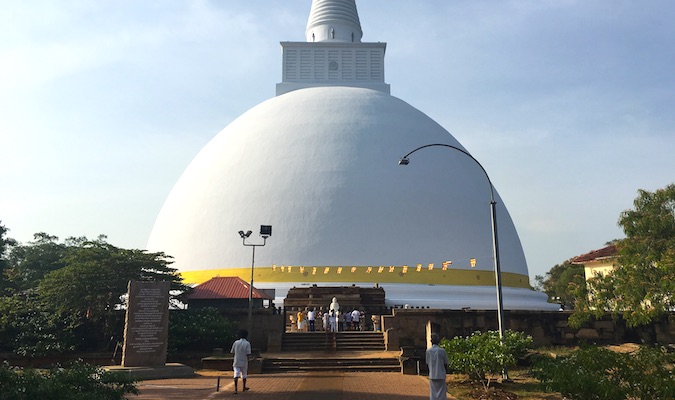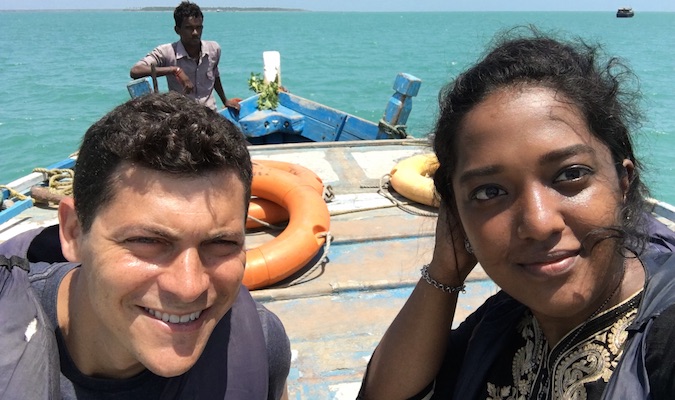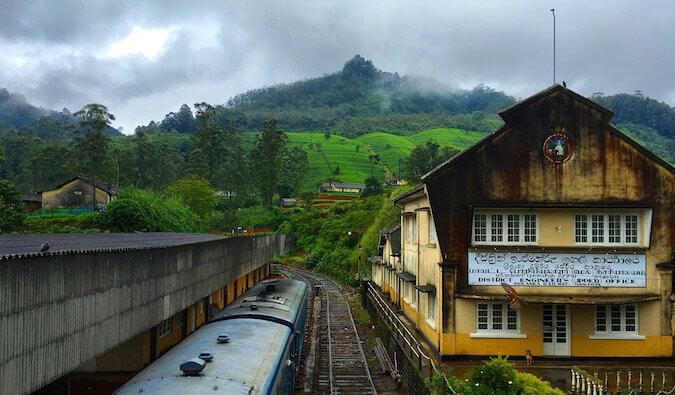
Updated: 7/14/22 | July 14th, 2022
I didn’t know much about Sri Lanka before my visit. Most of what I knew I picked up via the news and a few blog posts written by friends. It was, however, a blank slate I was eager to fill in.
When I got there, I found Sri Lanka to be a nation of luscious jungles, epic waterfalls, stunning hikes, Tomb Raider-esque archeological ruins, and delicious food (but unattractive cities).
But the one thing that really stood out was the people.
They are the first, second, third, and fourth things that come to mind when I remember my time in their country. I was amazed at how friendly, curious, and hospitable the people were.
I know, I know. What a cliché, right?
It’s the most generic thing to say in travel. “The people in this destination were lovely and totally made the place.”
Sure, you’ll find that some cultures really are more outgoing and friendlier to strangers than others. But Sri Lankans stood out in a way I’ve never experienced before.
As a traveler, although you want to be open to experiences with everyone, you also have to keep a wary eye out in order to make sure you aren’t getting scammed or put in a dangerous situation. There’s a lot of “gut-checking” on the road.
Take, for example, tuk-tuk drivers. Having spent a lot of time in Southeast Asia, I’m used to dealing with tuk-tuk drivers who badger you for a ride and constantly try to rip you off or take you to shops where they receive kickbacks if you make a purchase.
In contrast, throughout Sri Lanka, I found that driver after driver would slow down, ask if I wanted a ride, and then, when I said no, wish me a good day and drive off. No badgering! (OK, a tiny bit in Colombo, but that was mild compared to other countries.)
Moreover, I found the tuk-tuk drivers to be honest brokers, giving me rates close to what guesthouse owners said they should be. (I never thought I would use the term “honest” and “tuk-tuk drivers” in the same sentence!)
Then there were the locals who would approach me near a tourist site or on the street. After years of travel, my initial thought when this happens is usually: “Here is yet someone else trying to sell me something.”
As they started asking me about where I was from and how I liked their country, I was expecting them to get into “the sell” but instead was shocked that they would then just wish me well and walk away.
Is this a trick? I thought.
Nope, they were simply interested in my experience of their country. It caught me off guard the first couple of times, but after a while, I relished each opportunity to meet someone new. Each day there would be countless such interactions with people just happy to engage with a traveler.
Then there was the family I stayed with outside Sigiriya, who frequently cooked me a traditional dinner and provided me with rides into town when none could be found.
And there was the woman who owned the hostel in Kandy, who gave me a big hug and a kiss and told me to come back…after staying only one night! (She also did this to the other guests who were checking out when I was.)
There was also the tour driver in Tissa, who insisted on taking me out for beers to celebrate seeing a whole herd of elephants.
Friendly locals I met on the buses offered me food. One guy who felt so sorry that I had to stand up for six hours said, “I would give you my seat, but I have a baby in my arms. I’m really sorry.” And he meant it. He really was sorry he couldn’t give me his seat. I mean, how many people would make that same offer in the US?
But there was one experience that taught me the most about Sri Lanka and its people.
Before I arrived, I had exchanged emails with a girl who worked in Colombo; her dad was a Tamil journalist during the civil war and is now a member of parliament. She told me that she would be heading up to Jaffna to see her family and that I was welcome to join her. I immediately said yes and changed my travel plans. This was a chance to meet some locals and get an insider perspective on the conflict that scarred the country for decades.
Sri Lanka is a divided island, with the south dominated by Buddhist Sinhalese and the north by Hindu Tamils. After the British left in 1948, the Sinhalese controlled the government and enacted a series of laws that limited Tamil participation in Sri Lankan society. Eventually, Tamil protests turned violent and a 26-year civil war ensued (ending in 2009).
So with that in mind, I woke up early one day to meet “L” and her mother for the drive to Jaffna, the major town in the Tamil north and the scene of a lot of destruction during the civil war. In the northern countryside, I couldn’t help but notice how barren the land was. There was little grass around, and many houses had been abandoned and left in ruins. At various spots along the way, L and her mother explained that this once-fertile land was destroyed during the war and that many Tamils fled. (In fact, despite the war being long over, there are still over 90,000 displaced Tamils in refugee camps.)
“Are those people over there rebuilding the houses?” I asked.
“That’s the army building houses, but probably not for Tamils.”
“How come this area hasn’t been rebuilt?”
“Well, many people have left or were killed, and those who remain don’t have the money. Plus, a lot of the records were destroyed, so not many people can prove their house is really theirs.”
I persisted with my litany of questions. “How come this area seems so underdeveloped compared to the rest? Hasn’t there been a plan to rebuild?”
“The scars of the war are still here. For close to 30 years, we didn’t have access to the outside world, and no, the government isn’t really putting funds into development. We have an uneasy truce.”
Afterward, we went to L’s family’s newspaper, Uthayan, where we waited for the editor. This newspaper was the only Tamil news organization to survive the war. The government tried to shut it down many times, but it managed to live on. In the main room, you could see bullet holes from attacks, ruined computers, and graphic pictures of the journalists who lost their lives in paramilitary attacks. There was a wall dedicated to those who are missing — and probably dead.
“Are things better now?” I asked the editor.
“Sure. The fighting has stopped, but that doesn’t mean everything is normal. It is still the same military leaders and government officials in power. But things are moving in the right direction.”
“Did you support the Tigers?” I asked him, broaching the topic head-on. The Tamil Tigers were a student organization that turned from resistance fighters to terrorist group. Their defeat was what helped end the civil war.
“The Tigers might have started with good intentions, but in the end, they became as bad as the government and alienated the population they sought to support. So, no, I did not.”
L and the editor gave me a tour of the newspaper, showing off more relics of raids and introducing me to staff and editors who also worked throughout the war. The building, like the land we just saw, bore the scars of war.
It was an eye-opening experience to see the region and learn about the conflict and how it still affects the people of the region.
As I took the bus to the airport and got ready to leave Sri Lanka, my mind kept going back to its people. Regardless of where I was and who I spoke to, I was welcomed with open arms, treated as family and with kindness.
Sri Lanka was better than I could have imagined it. Not because of all the beautiful sites and fun activities, but because the people made a stranger feel at home.
Book Your Trip to Sri Lanka: Logistical Tips and Tricks
Book Your Flight
Use Skyscanner to find a cheap flight. It is my favorite search engine, because it searches websites and airlines around the globe, so you always know no stone is being left unturned!
Book Your Accommodation
You can book your hostel with Hostelworld as it has the biggest inventory and best deals. If you want to stay somewhere other than a hostel, use Booking.com, as it consistently returns the cheapest rates for guesthouses and hotels.
Don’t Forget Travel Insurance
Travel insurance will protect you against illness, injury, theft, and cancelations. It’s comprehensive protection in case anything goes wrong. I never go on a trip without it, as I’ve had to use it many times in the past. My favorite companies that offer the best service and value are:
- Safety Wing (best for everyone)
- Insure My Trip (for those 70 and over)
- Medjet (for additional evacuation coverage)
Looking for the Best Companies to Save Money With?
Check out my resource page for the best companies to use when you travel. I list all the ones I use to save money when I’m on the road. They will save you money too.
Want More Information on Sri Lanka?
Be sure to visit our robust destination guide on Sri Lanka for even more planning tips!



